Student computing groups organize education-themed hackathon in Oakland
Author: Dakota Castro-Jarrett
Date: 11.12.24
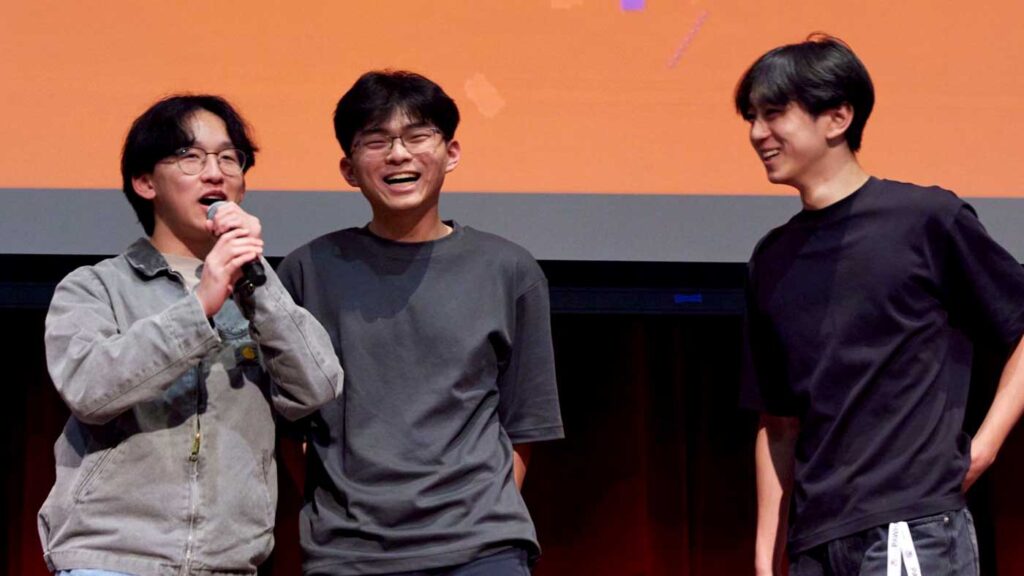
When Arav Kumar, a first-year computer science major, heard about the hackathon being hosted on Northeastern’s Oakland campus, he didn’t have much interest in joining. Eventually, his friends, some of whom were organizing the event, encouraged him to sign up, and his roommates, who were struggling to find a good idea for the event’s education theme, asked him for help.
It wasn’t too much of a shock to Kumar; thanks to his interests in philosophy, art, and music, he’s always pursued his creative side. Together, the group began to brainstorm possible project themes.
That brainstorming session resulted in a project that landed the team first place.
The hackathon, called PawHacks, took place this past spring and was one of the first major student-run events on the Oakland campus since the Northeastern–Mills College merger in 2022. It was a novel exercise for the undergraduates who organized it, and one that made the campus feel more alive for many of the student participants.
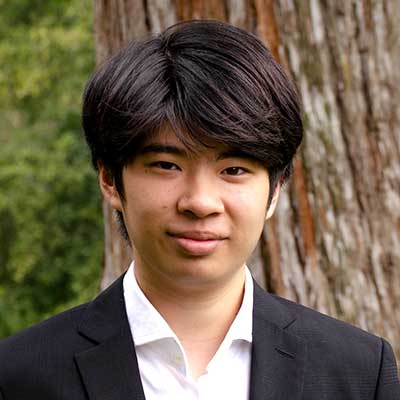
Rich Zou, a first-year computer science and business administration major and president of the Oakland branch of Northeastern’s Entrepreneurs Club, came up with the idea for PawHacks after some of his friends attended CalHacks — the world’s largest collegiate hackathon — at nearby UC Berkeley.
“My friends were participating in it, and I was visiting them that weekend … and I just saw how big it was,” Zou said. “I wanted to host a hackathon of my own.”
To organize such an event, Zou knew he’d need support from others who had more experience with coding. This led him to reach out to Girls Who Code and the CS Coalition, two student-led computing clubs that have played a significant role on the new campus.
READ: In Oakland, Khoury students build computing clubs to connect, compete, and collaborate
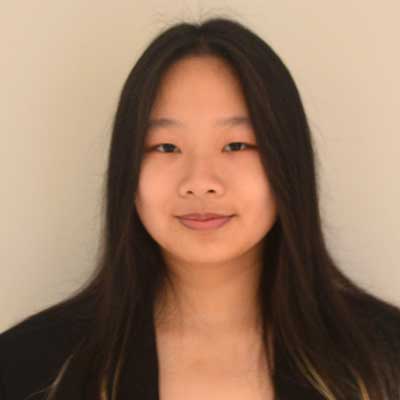
“It was a little idea at first,” said Jasmine Yuen, a first-year computer science major and president of Girls Who Code. “We were sitting in the library, and we were talking about doing this big event … We were pretty excited for it, but honestly, it was hard to [see it coming] to reality.”
Together, these clubs chose an education theme and created the agenda for the event, which included an opening ceremony and programming workshops. They also sought the funding they needed to make PawHacks a reality. With the help of James Chang-Davidson, a recent Khoury graduate and founder of Kaleidoscope, Zou reached out to Khoury College as well as the entrepreneurial organization Mosaic.
READ: Inside Kaleidoscope, the student-led council supporting and uniting Khoury College clubs
The organizers also received key fundraising guidance from Major League Hacking (MLH), a student hackathon league that hosts more than 300 hackathons every year. Using MLH’s advice, the group raised more money from groups outside of Northeastern.
MLH also collects logistical data from past events, information that helped the group of student organizers know what they needed to have ready for the event to run.
Meet the winners
Kumar’s inspiration for his group’s first-place project came from seeing his best friend, who has dyslexia, struggle with an education system that wasn’t made for him.
“He’s the smartest guy. He does differential equations while at the gym,” Kumar said. “I wanted to help him, so we came up with the idea of [helping anyone] learn about anything they want using AI.”
This project, which became known as CurveAI, aimed to develop an app that used AI to customize learning programs based on each student’s learning style. The creation process wasn’t easy; while Kumar had a lot of AI experience, neither he nor his group mates knew much about creating an app.
“A lot of the first day was spent just trying very hard to figure everything out,” Kumar said.
Despite the team’s limited knowledge of the subject, their passion for the mission of the app helped keep them on track for the win, as did an admittedly “dangerous amount of caffeine.” Another factor, Kumar said, was the strength of their three-minute pitch to the judges’ panel. This part of PawHacks gave students a chance to flex their entrepreneurial muscles, a critical skill in a tech industry that constantly seeks new ideas from fiercely competitive start-ups. The CurveAI team recognized how important this pitch was, especially given that some of the judges were venture capitalists. So early on, they decided to focus on an emotionally gripping story and centered Kumar’s friend with dyslexia to show the importance of their project.
LinguaLink, the second-place winner, is a language learning website that employs a mix of text and video chats with native speakers — as well as text chats with AI chatbots — to help users learn their target language. According to their description on the PawHacks website, the LinguaLink group struggled to ensure that every element of the website worked together seamlessly. Still, they ultimately achieved their vision with their own AI and support for 50 languages.
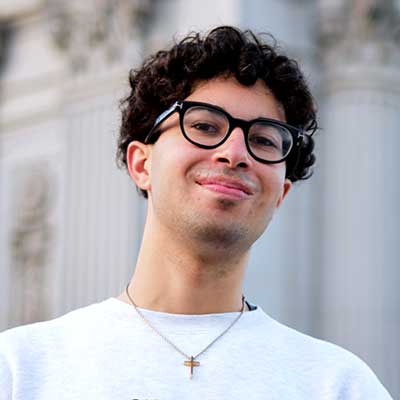
Like the CurveAI team, the third-place Lectura team was created in reaction to personal experience. Ryan Amiri, a first-year computer science major, had noticed that some computing instructors were battling to keep their students engaged. Even when instructors used interactive tools that allowed students to ask and answer questions, they wouldn’t always get enough class participation. Some students would allow their classmates to answer the professor’s questions and wouldn’t ask or answer anything themselves.
“We were in our Fundies (Fundamentals of Computer Science courses) class, which used a website that gives interactive questions to make sure students are paying attention,” Amiri said. In addition, another website called Slideshow allows students to ask questions.
But still, the group thought, the class participation could be better, so they set out to create a website to incentivize it. They began by combining the engagement tools that instructors were using into one streamlined platform.
“Then we added a point system. So, for example, for every question students answer correctly, they get points,” Amiri said. “And if students ask questions, and an instructor thinks it is a good question, an instructor can reward them with however many points they choose.”
Lectura would track these points on a leaderboard, allowing the instructor to award or reward high-scoring students. While the group didn’t earn the top prize at PawHacks, they received interest from the instructors who inspired the project in the first place, and who believed that the project could help.
“I think what made us really successful was that our problem was very widespread across many colleges in the United States … [and in] high school classrooms,” Amiri said.
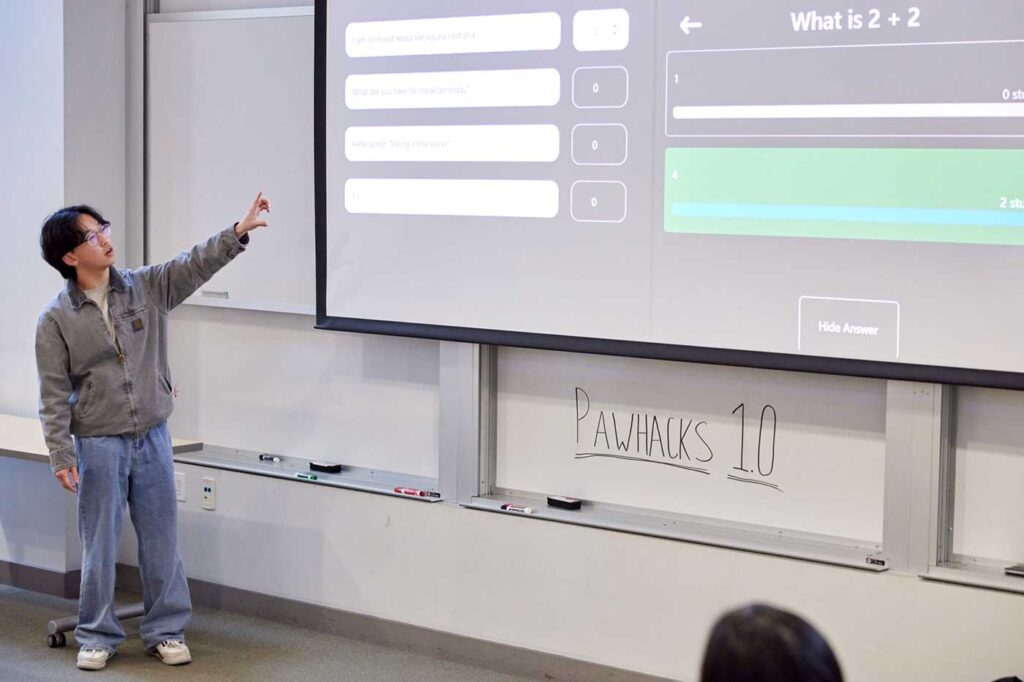
Local impact
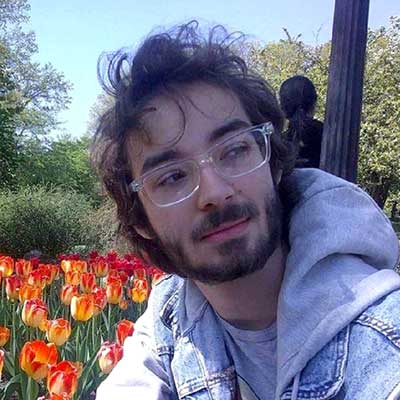
For those who participated in PawHacks, one of the highlights was the energy the event brought to one of Northeastern’s newest campuses. The campus culture and community needed to be built after the merger in 2022, and for students like Danny Sklyarevskiy — a first-year computer science student, president of the CS Coalition, and a co-organizer of PawHacks — the campus’s smaller size presented unique opportunities to do so. Events like PawHacks, he said, “showed that this campus can give a lot of opportunities to incoming freshmen that are much harder to get on bigger campuses.”
Sklyarevskiy also believes that the newness of the Oakland campus created an environment that encouraged students to take up the task of creating their own campus culture. Freshmen founded clubs and took up leadership positions, taking up roles that in Boston are often already filled by upperclassmen.
“Here a lot of people come in with zero leadership experience and end up hosting an entire hackathon by themselves,” said Sklyarevskiy. “I think it drives a lot of people … become more interested in leadership.”
The Khoury Network: Be in the know
Subscribe now to our monthly newsletter for the latest stories and achievements of our students and faculty